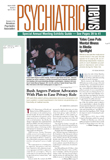Do you like listening to music by the great Romantic composer Peter Tchaikovsky? And would you like to learn how his mental states influenced his works?
If the answers are yes, then a forum that will be held at APA’s 2002 annual meeting in Philadelphia should be on your priority list.
The forum is called “Music and Mood Disorders: Tchaikovsky” and will be presented by a psychiatrist who is also a highly acclaimed concert pianist—Richard Kogan, M.D., of New York City.
Tchaikovsky suffered from depression throughout most of his life, Kogan explained in an interview with Psychiatric News. The depressions started in 1854, when he was 14 years old and when his mother died, and did not let up for the rest of his life.
During his bouts of depression, Tchaikovsky experienced not only pervasive melancholy, but also insomnia, lack of appetite, and other classical signs of depression and sometimes even delusions and hallucinations. Yet while he undoubtedly suffered greatly from these symptoms, they probably also gave him incentives to create his music.
“I think because of the anguish that he experienced, Tchaikovsky was more motivated to create than is somebody who has not experienced such anguish,” Kogan asserted. “Many of our greatest creators, not just in music but in other fields, use their inner torment as a source of inspiration.”
But Tchaikovsky’s depressions were not only a source of inspiration; sometimes he expressed them directly in his music—for example, in the last of his six symphonies. “This is a piece of inconsolable anguish and grief,” said Kogan. Nine days after it premiered, Tchaikovsky died, and there is reason to believe that he took his own life.
Sometimes Tchaikovsky’s depressions prompted him to create fantasy worlds where he could escape—for example, through his ballets. “These were fantasy worlds of beauty, charm, and grace, and they were completely different from his inner melancholy,” Kogan explained.
At the annual meeting forum, Kogan will be performing Tchaikovsky’s First Piano Concerto as an example of one of the fantasy worlds that Tchaikovsky created. “This is a lavish work with all sorts of gorgeous melodies,” Kogan said.
Yet for Tchaikovsky, musical composition was not just an expression of suffering or an escape from suffering, but a lifeline. “He said many times that music kept him sane,” Kogan pointed out.
All in all, Tchaikovsky’s music is very autobiographical, Kogan said. Thus, those attending Kogan’s annual meeting forum will not only learn how Tchaikovsky’s mental states influenced his musical compositions, but also will hear, via some of the Tchaikovsky pieces that Kogan will play, Tchaikovsky’s poignant life story.
Kogan’s forum, “Music and Mood Disorders: Tchaikovsky,” will be held Monday, May 20, from noon to 1:30 p.m. in the Pennsylvania Convention Center. ▪
